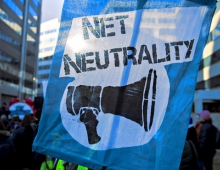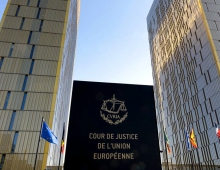
Internet Companies Fight for the Internet's Future
AOL, eBay, Facebook Google, Mozilla, Yahoo! and Twitter have
joined other leading Internet companies, public interest groups and citizens in opposing The Stop Online Piracy Act (SOPA) in the US House of Representatives.
The Stop Online Piracy Act bill would give the U.S. Attorney General power to order search engines and Internet service providers to block sites with pirated content. It would also give copyright holders the ability to issue notifications to payment providers like Paypal when a site is selling copyrighted material. They would also be able to sent notifications to companies that specialize in Internet advertising, all without the assistance of a court. Finally, Web sites that make money off selling counterfeit pharmaceutical drugs would be facing much harsher penalties with new rules laid out in the bill.
A hearing on the bill has been scheduled for November 16 and internet leaders are oposing the bill by participating to the American Censorship Day. Companies including Mozilla, AOL, eBay, Facebook, Google, LinkedIn, Twitter, Yahoo!, and Zynga sent Congressional leaders a joint letter, raising our concerns with the bill.
"The decision to inform legislators and users of our serious reservations with SOPA was a no-brainer and fell into place quickly over just a few days of discussion, Mozilla said in a statement. "We believe The Stop Online Piracy Act threatens our ability as an industry to continue to offer our many important software and web services to the hundreds of millions of users who rely on them, as well as the many employees and developers we support to innovate these technologies."
"For Mozilla, we see this as a fight for the future of the Internet," the company added.

The companies support the bills' stated goals - providing additional enforcement tools to combat foreign "rogue" websites that are dedicated to copyright infringement or counterfeiting. On the otehr hand, the bills as drafted would expose law-abiding U.S. Internet and technology companies to new uncertain liabilities, private rights of action, and technology mandates that would require monitoring of web sites.
"We are concerned that these measures pose a serious risk to our industry's continued track record of innovation and job-creation, as well as to our Nation's cybersecurity. We cannot support these bills as written and ask that you consider more targeted ways to combat foreign "rogue" websites dedicated to copyright infringement and trademark counterfeiting, while preserving the innovation and dynamism that has made the internet such an important driver of economic growth and job creation," the companies wrote in their letter to Congressional leaders.
" We are very concerned that the bills as written would seriously undermine the effective mechanism Congress enacted in the Digital Millennium Copyright Act (DMCA) to provide a safe harbor for internet companies that act in good faith to remove infringing content from their sites," the letter reads. "While we work together to find additional ways to target foreign rogue sites, we should not jeopardize a foundational structure that has worked for content owners and Internet companies alike and provides certainty to innovators with new ideas for how people create, find, discuss, and share information lawfully online."
"The solutions are draconian," Google Executive Chairman EricS chmidt said during an appearance at the MIT Sloan School of Management. "There's a bill that would require (Internet service providers) to remove URLs from the Web, which is also known as censorship last time I checked."
A hearing on the bill has been scheduled for November 16 and internet leaders are oposing the bill by participating to the American Censorship Day. Companies including Mozilla, AOL, eBay, Facebook, Google, LinkedIn, Twitter, Yahoo!, and Zynga sent Congressional leaders a joint letter, raising our concerns with the bill.
"The decision to inform legislators and users of our serious reservations with SOPA was a no-brainer and fell into place quickly over just a few days of discussion, Mozilla said in a statement. "We believe The Stop Online Piracy Act threatens our ability as an industry to continue to offer our many important software and web services to the hundreds of millions of users who rely on them, as well as the many employees and developers we support to innovate these technologies."
"For Mozilla, we see this as a fight for the future of the Internet," the company added.

The companies support the bills' stated goals - providing additional enforcement tools to combat foreign "rogue" websites that are dedicated to copyright infringement or counterfeiting. On the otehr hand, the bills as drafted would expose law-abiding U.S. Internet and technology companies to new uncertain liabilities, private rights of action, and technology mandates that would require monitoring of web sites.
"We are concerned that these measures pose a serious risk to our industry's continued track record of innovation and job-creation, as well as to our Nation's cybersecurity. We cannot support these bills as written and ask that you consider more targeted ways to combat foreign "rogue" websites dedicated to copyright infringement and trademark counterfeiting, while preserving the innovation and dynamism that has made the internet such an important driver of economic growth and job creation," the companies wrote in their letter to Congressional leaders.
" We are very concerned that the bills as written would seriously undermine the effective mechanism Congress enacted in the Digital Millennium Copyright Act (DMCA) to provide a safe harbor for internet companies that act in good faith to remove infringing content from their sites," the letter reads. "While we work together to find additional ways to target foreign rogue sites, we should not jeopardize a foundational structure that has worked for content owners and Internet companies alike and provides certainty to innovators with new ideas for how people create, find, discuss, and share information lawfully online."
"The solutions are draconian," Google Executive Chairman EricS chmidt said during an appearance at the MIT Sloan School of Management. "There's a bill that would require (Internet service providers) to remove URLs from the Web, which is also known as censorship last time I checked."





















